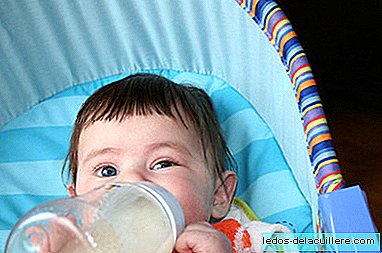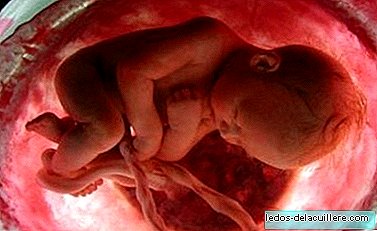
We have spent days turning to the issue of excess protein in infant feeding and today we will give another twist to this issue because a recent study funded by the European Union reveals that The higher protein content in the adapted formulas could explain why babies who drink artificial milk tend to gain more weight than those who drink breast milk.
Several studies already show the relationship between a rapid weight gain in childhood and the tendency to obesity in adulthood and that is why it is worrying that babies fed with formula milk gain more weight than those fed with breast milk.
The objective of the study we discussed, framed in the EU Childhood Obesity Program, was to analyze the possibility that the amount of protein in the adapted formulas was the cause of this greater weight gain.
How did they do the study
To do the study they used a sample of more than a thousand babies from five different countries that were already fed with adapted formulas and were divided into two groups. Babies of one of them were given formula milk with a high protein content (2.9 g / 100 kcal in the starting formulas and 4.5 g / 100 kcal in the continuation formulas) and babies of the other Formula milk with a lower protein concentration (1.77 g / 100 kcal in the starter formulas and 2.25 g / 100 kcal in the follow-up formulas).
Weight and height controls were performed at 3, 6, 12 and 24 months and the results were contrasted with a third group of babies who only received breast milk.
What was the results
The result is that children who took formula with a high protein content they weighed more than those who drank milk with less protein, without differences in height (so they had a higher body mass index).
Comparing children who drank artificial milk with a lower protein content and those who drank breast milk, it was observed that there were no significant differences in weight gain or height at 24 months.
According to the researchers, these findings underscore the importance of promoting and supporting breastfeeding as a main food in childhood as well as the need to continue improving the composition of adapted formulas by limiting protein content.
Less protein, less risk of obesity
Reducing the concentration of proteins could contribute to normalize the early growth of babies who drink artificial milk and reduce the long-term risk of overweight and childhood obesity. The children studied will continue to be observed to find out if those who took adapted formulas with lower protein content actually have a lower risk of obesity throughout their lives.
Assessing the amounts of protein ingested by children, and taking into account that the high-protein milk that babies took was within the recommended ranges, I must say that it would be difficult, today, to buy milk with such a quantity of protein .
Manufacturers have long been aware that formula milks cause a higher risk of childhood obesity and are therefore working to decrease the protein content of their formulas.
I do not know the amount of protein in all artificial milks, but assessing some of the best known I can say that, luckily, the amounts are similar to the milk of lower protein content given to the children in the study.
Hopefully, as the authors say, work continues to promote and support breastfeeding and manufacturers improve formulas to reduce the risk of overweight and childhood obesity in those children who drink artificial milk.












